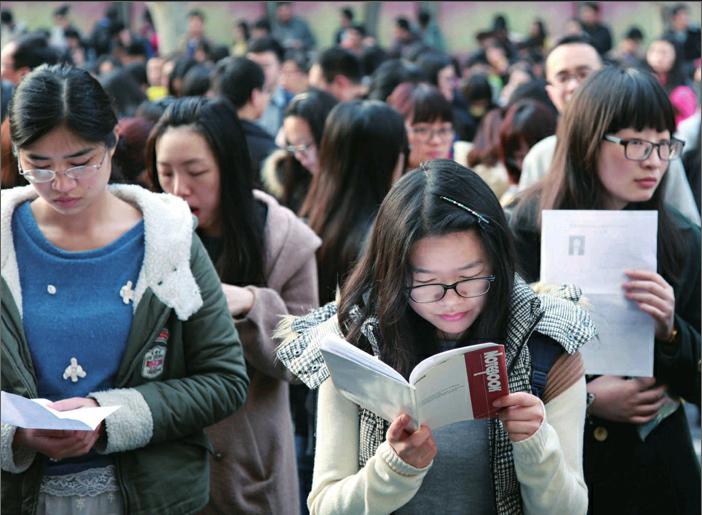Advocating Meritocracy
2017-04-04ByJiJing
By+Ji+Jing

Daniel Bell, currently a political theorist, became an enthusiast of China in 1989 when he met his Chinese wife, Song Bing, during his studies at Oxford. The Canadian national became even more interested in China after getting married and worked hard to learn Chinese.
After receiving his PhD from Oxford University in 1991, Bell taught at National University of Singapore, University of Hong Kong, and City University of Hong Kong before becoming a professor of philosophy at Tsinghua University in 2004.
Bell said he has become increasingly Chinese after working and living in Beijing for over a decade. When he returns to Canada, he uses Chinese standards to judge local peoples behavior. For instance, in China, people wait until guests walk into the distance when they see them off. However, when Bell went back to Canada, his mother closed the door immediately after he left. Having gotten used to the Chinese way of treating guests, Bell said he felt uncomfortable hearing the door close.
When his students say he is handsome, he doesnt say “thank you” like most Westerners, but replies modestly like a Chinese person, “No, no.”
“The longer I stay in China, the more I recognize Confucianism,” Bell said.
In January, Bell assumed his new post as dean of the School of Political Sciences and Public Administration at Shandong University.
“Bells appointment is of great importance to the development of the subjects of humanities and social sciences in Shandong,” said Zhang Rong, President of Shandong University.
“It is an exciting opportunity: the faculty is one of the top faculties in politics and public administration in China, and a beautiful new campus has opened in Qingdao,” Bell said. “The university is rooted in Shandong [Province], which has a strong commitment to learning and Chinese traditions, especially Confucianism. And the city is relatively new and forward looking, so we aim to combine the best of traditional thinking with openness to the world.”
A new model
Bell is interested in Confucianism and has read Confucian classics such as The Analects of Confucius and The Doctrine of the Mean many times. He admires Confucius (551-478 B.C.) and often cites the philosophers words in his classes.
He appreciates the concept of harmony endorsed by Confucianism. “Without different countries seeking common ground while shelving differences, war will break out constantly; without harmony between human and nature, human beings will destroy nature, leading to disasters,” he said.
As a researcher of political science, Bell is most interested in the meritocracy of Confucianism, which features the selection of capable and virtuous leaders to head a society.
Bells The China Model: Political Meritocracy and the Limits of Democracy published in June 2015 by Princeton University Press spurred widespread controversy in the West.
Bell pointed out the flaws of Western democracy and explored the possibility of meritocracy becoming an alternative. He believes that meritocracy is more suitable for countries with complex political, social and economic challenges like China and can even be drawn upon by the West.
Bell was criticized as degrading democracy and adoring the Chinese model by some Western scholars.
He said he was not surprised by the criticisms because Westerners, who have an obsession with electoral democracy, regard one person, one vote as the only legitimate way of selecting political leaders, and any alternative model is considered immoral.
“I would not have written this book without a decades experience living and teaching in Beijing, and perhaps I would have been shocked by some of my own arguments had I read them two decades ago,” Bell wrote in the books introduction.
“There is much better understanding of Western-style democracy in China than of Chinese-style meritocracy in the West, and my book is meant to provide some symmetry,” he continued.
Bell thinks it is problematic to implement one person, one vote in a large country because voters are more concerned with improving their own well-being rather than taking into consideration public interests.
In addition, only adults within the border of a country have the right to vote, while the results of voting not only infl uence a countrys adults but future generations and other countries peoples.
“In Europe and the United States, people often vote for low tax and high welfare, without realizing such policies would make a country fi nancially stretched in the long run. However, problems such as global warming, which threatens the survival of future generations, often receive little attention,” Bell said.
Chinas approach
“The Chinese official selection system is the most competitive i n the world at present,” Bell said.
“It takes as long as 30 years for an offi cial to rise through the ranks. In this process, offi cials can dedicate themselves to improving their knowledge and political performance rather than wasting time and money for votes, because only excellent offi cials can be promoted to the higher-level government,” Bell added.
For most people, the fi rst step to enter the government in China is to pass the national college entrance examination, or gaokao. Then one needs to pass the civil service exam, which is one of the most competitive in China, where its common for thousands of candidates to compete for one position.
In order to rise through the ranks of government, an official is required to perform well at community-level government and pass a series of assessments.
The system enables the Chinese leadership to formulate policies based on the countrys long-term interests.
“Such a model suits Chinas culture, historical traditions and the needs of contemporary society… China should improve the current approach rather than copy Western democracy,”Bell suggested.
